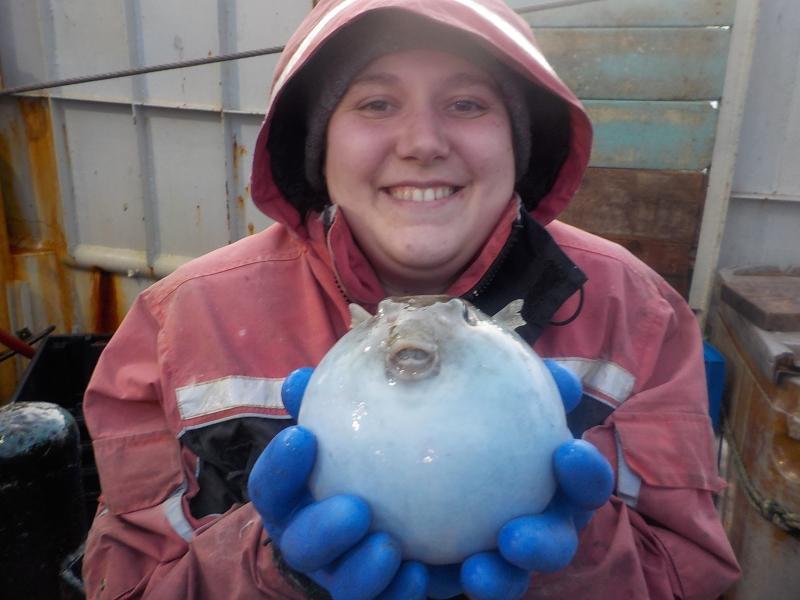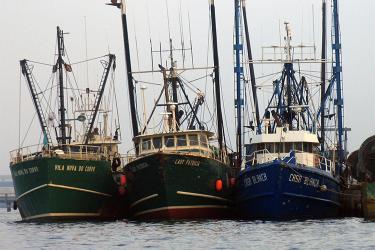As a young child, Beth Nelson already knew that her future would involve the sea. While recovering after a serious car accident at age 4, Nelson spent months watching the movie Free Willy several times a day. The film cemented a love and fascination for marine life, and sparked a desire to see more of the world. Despite growing up in landlocked upstate New York, Nelson’s interest in marine science and marine mammals grew steadily and was encouraged by family and friends.
After graduating from the University of Maine with a bachelor’s degree in marine biology, she wasn’t sure which direction to take next in her dream field. She was back home in New York working odd jobs and considering work in labs or on boats. She had applied for dozens of positions, including fisheries observer jobs that would allow her to experience life at sea on a fishing boat.
As professionally trained biological technicians, observers work aboard commercial fishing vessels collecting data on what’s caught and thrown back. They also track interactions with marine mammals, sea turtles, and seabirds, in order to monitor and sustainably manage fisheries. Nelson’s intensive, months-long job search culminated with a call from an observer provider company offering an interview. The position sounded like the perfect fit, and she soon accepted a job offer.
After completing the Northeast Fisheries Observer Program training in June 2019, Nelson is now a NOAA Fisheries observer based out of Gloucester, Massachusetts. She is among about 850 other fishery observers nationwide who spend a total of more than 71,000 days at sea while monitoring 54 commercial fisheries. In 2019, more than 12,000 of these monitoring days were carried out by 189 observers in the Northeast, covering 27 fisheries.
Early Mornings and Long Days
Nelson’s shifts are long and sometimes last for multiple days. When she is assigned to a boat for a trip, she begins preparation around noon the day before her scheduled departure. This involves planning her drive to the pier, organizing paperwork, and packing food and gear. Once the trip is confirmed, she takes her seasickness medicine and tucks in for a few critical hours of sleep. Trips typically begin between 2 a.m. and 5:30 a.m., and Nelson must be prompt in meeting the fishers at the docks for departure.
Nelson observes on pot and trap, gillnet, and trawl trips. She is also certified to observe high volume fisheries, such as herring vessels that use pumps to get large amounts of catch onboard. She works with the captain and crew to sort through catch and then collect and record data, including:
- Gear and trip information
- Fish measurements
- Which species were discarded and why
- Marine mammal data and tags
She also takes photos of fish that can’t be identified on the spot.
She says that while some trips can be stressful and that every set of conditions is different, her experiences with crews are always amicable. “The [fishers] understand that you’re there to do a job, and they’re willing to work with you as long as you’re willing to work with them,” Nelson says. “They’re usually really nice, and they try, and that’s all they expect from observers—for us to try back,” she says.
After several hours at sea, the captain signals a return to port. That can happen anytime between 2 p.m. and 9 p.m., with some day trips lasting longer than 12 hours. Nelson lands with the crew, fills up on coffee, and heads home, sometimes readying herself for another trip the very next morning.
A “Second Family”
Because she covers ports ranging from Maine to New Jersey, Nelson spends a good deal of time on the road in addition to on the water. But the sometimes-tough conditions and unpredictable schedule don’t bother her. Instead, Nelson says that the job’s flexibility offers an enviable work-life balance, and that being an observer has given her a second family. With the Northeast Fisheries Science Center staff and her observer teammates, Nelson is surrounded by people who understand and support one another.
“There are some things I could never explain about the job to anyone else, but if you tell another observer, they understand,” she says. “And it’s nice to have that family and that connection and know that you’re part of a small, special group of people.”
Even chronic seasickness doesn’t deter Nelson from loving her job—developing mental strength, she says, is the best thing you can do. And it seems an even trade for the “wonder” moments that come from being an observer.
“Wonder” Moments
“What I get to see, it’s really special. A sunrise all around you with no other boats? Animals that you’d never see otherwise? One of my favorites is the Atlantic wolffish, one of the coolest animals on the planet. It’s a new adventure every day. Every haul is a new adventure,” says Nelson. And those adventures translate into real-time impact for fisheries and resource management and conservation.
Nelson has considered becoming an observer debriefer or trainer once her time as an observer comes to a close, or she could go in an entirely different direction. Either way, she isn’t worried about what comes next. “There are a lot of doors open for me because of this profession, and I’m very grateful for that,” says Nelson, who, in addition to spending time on boats, actively serves as a mentor for new observers.
Her advice for would-be observers? “Make sure you’re ready for anything. If you put the time in, the time will come back to you. Be ready to see things you never thought you would see in the whole world. At the same time, you are never alone out there, no matter how far out you think you are.”




